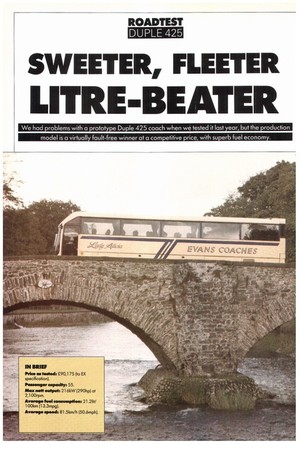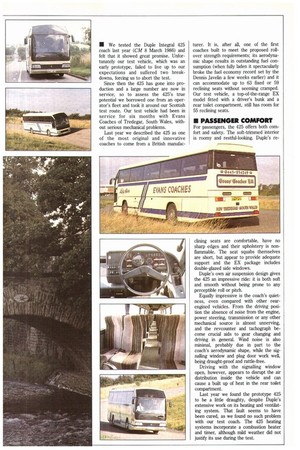SWEETER, FLEETER
Page 76

Page 77

If you've noticed an error in this article please click here to report it so we can fix it.
LITRE BEATER
• We tested the Duple Integral 425 coach last year (CM 8 March 1986) and felt that it showed great promise. Unfortunately our test vehicle, which was an early prototype, failed to live up to our expectations and suffered two breakdowns, forcing us to abort the test.
Since then the 425 has gone into production and a large number are now in service, so to assess the 425's true potential we borrowed one from an operator's fleet and took it around our Scottish test route. Our test vehicle had been in service for six months with Evans Coaches of Tredegar, South Wales, without serious mechanical problems.
Last year we described the 425 as one of the most original and innovative coaches to come from a British manufac turer. It is, after all, one of the first coaches built to meet the proposed rollover strength requirements; its aerodynamic shape results in outstanding fuel consumption (when fully laden it spectacularly broke the fuel economy record set by the Dennis Javelin a few weeks earlier) and it can accommodate up to 63 fixed or 59 reclining seats without seeming cramped. Our test vehicle, a top-of-the-range EX model fitted with a driver's bunk and a rear toilet compartment, still has room for 55 reclining seats.
• PASSENGER COMFORT
For passengers, the 425 offers both comfort and safety. The soft-trimmed interior is roomy and restful-looking. Duple's re dining seats are comfortable, have no sharp edges and their upholstery is nonflammable. The seat squabs themselves are short, but appear to provide adequate support and the EX package includes double-glazed side windows.
Duple's own air suspension design gives the 425 an impressive ride: it is both soft and smooth without being prone to any perceptible roll or pitch.
Equally impressive is the coach's quietness, even compared with other rearengined vehicles. From the driving position the absence of noise from the engine, power steering, transmission or any other mechanical source is almost unnerving, and the revcounter and tachograph become crucial aids to gear changing and driving in general. Wind noise is also minimal, probably due in part to the coach's aerodynamic shape, while the signalling window and plug door work well, being draught-proof and rattle-free.
Driving with the signalling window open, however, appears to disrupt the air distribution inside the vehicle and can cause a built up of heat in the rear toilet compartment.
Last year we found the prototype 425 to be a little draughty, despite Duple's extensive work on its heating and ventilating system. That fault seems to have been cured, as we found no such problem with our test coach. The 425 heating systems incorporate a combustion heater and timer, although mild weather did not justify its use during the test.












































































































































































